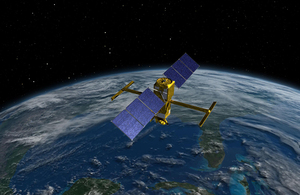SWOT (Surface water and ocean topography)
The UK Space Agency is part of the SWOT mission, which is a global satellite survey of the Earth's surface water.

Image Credit: NASA
Using specialised technology to measure the elevation of water, SWOT is observing oceans, major lakes, rivers and wetlands in high-level resolution.
SWOT data will provide information that is needed to assess water resources on land, track regional sea level changes, monitor coastal processes, and observe small-scale ocean currents and eddies. SWOT launched in December 2022.
.
Freshwater resources
SWOT will provide data from hundreds of thousands of lakes as well as the discharge volumes of medium-to-large rivers. These key measurements will support scientific research to:
- understand the global water cycle on land
- study the dynamics of floodplains and wetlands, which influence flood control and the balance of ecosystems
- provide a global inventory of water resources, including transboundary rivers, lakes and reservoir storage
Ocean, coasts and climate
Global ocean circulation balances Earth鈥檚 climate and makes our planet habitable.
However, much ocean motion occurs at scales too small to be detected globally with today鈥檚 technology. These small-scale ocean currents contain most of the energy that powers the mixing and transport of water and are important factors in assessing climate change.
Information from SWOT will be used to:
- measure ocean currents and swirling eddies at scales as small as 13 miles
- improve computer models that use ocean circulation data to project future climate conditions
- better understand coastal processes including those related to fisheries, ship navigation, shoreline erosion, and dispersal of pollutants
How is the UK involved?
The UK Space Agency is part of the mission, that has been jointly developed by and (CNES) with contributions from the (CSA).
has developed the Duplexer, a high-power switching system that is part of the radio-frequency unit, which was funded by the UK Space Agency who contributed 拢12.22 million.
Lead UK scientists are Paul Bell and Christine Gommenginger of the (NOC), Paul Bates of and Simon Neill of .